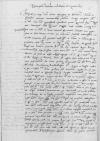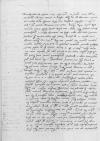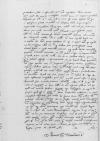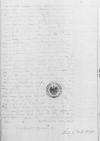⌊⌋ novissime, Illustrissimae Dominationis Vestrae ⌊⌋ amicissimis respondens, quas nuntius serenissimi ⌊regis⌋ mei, generosus dominus ⌊Ioannes Oczyeski⌋, mihi reddidit, nactusque iterum opportunitatem on the margin⌈opportunitatemopportunitatem on the margin⌉ pro mei in Illustrissimam Dominationem Vestram amoris observantia, committere non potui, quin et has darem, ne mei per diuturnam scribendi intermissionem intercedat memoria, quam maxime apud Illustrissimam Dominationem Vestram et recentem esse, et praesentem cupio, tum etiam, ut magnificum dominum ⌊Stanislaum Maczyewski⌋ serenissimi ⌊regis mei⌋ oratorem, fratrem reverendissimi domini ⌊episcopi Chelmensis, regni Poloniae vicecancellarii⌋, singularissimi amici mei, Illustrissimae Dominationi Vestrae intime commendarem. ⌊Qui⌋, cum in aliis arduis negotiis ad sacratissimam ⌊caesaream et catholicam⌋ atque ad serenissimam ⌊Romanorum, Hungariae et Boemiae maiestatem⌋ sit missus, habet nihilo secius et negotium proscriptionis sive banni ⌊camerae imperialis⌋ contra illustrissimum dominum ⌊Albertum marchionem Brandenburgensem etc. ducem in Prussia⌋ apud sacratissimam caesaream et catholicam maiestatem agendum sibi iniunctum. Quod cum ego superioribus annis in ⌊comitiis Imperii⌋ ⌊Augustae Vindelicorum⌋ ex mandato serenissimi ⌊regis mei⌋ tractare coeperim, non abs re me facturum existimo, si eius rei Illustrissimae Dominationi Vestrae, cui pro sua auctoritate ac officio non parum interest, ut, quae tunc gesta sunt, sciat, mentionem fecero.
Non excidisse, puto, Illustrissimae Dominationi Vestrae, quibus modis sacratissima ⌊caesarea et catholica maiestas⌋ in ⌊foro Augustano⌋ ⌊magistro ordinis Teutonicorum per Germaniam⌋ ad terras quondam per ⌊ordinem⌋ hic in ⌊Prussia⌋ occupatas investituram cum solitis caeremoniis dederit. De qua postquam nomine serenissimi ⌊regis mei⌋ protestare statuissem, sacratissima ⌊caesarea et catholica maiestas⌋ mihi respondit opus non esse, quandoquidem investitura nihil addere iuris darique illam solere sine cuiuscumque alterius praeiudicio iuris ac proprietatis. Cumque instarem, ne ob datam eiusmodi investituram sua ⌊caesarea et catholica maiestas⌋ permitteret, ut quisque contra serenissimum ⌊regem meum⌋ eiusque principem vasallum, illustrissimum dominum ⌊marchionem et ducem in Prussia⌋, coram ⌊iudicio camerae⌋, quod eum ms. cum(!)
⌈eumeum ms. cum(!)
⌉ principe<m> ⌊Regni⌋ sui serenissimus rex meus non recognosceret, processum huius causae temptaret ms. tentaret(!)
⌈temptarettemptaret ms. tentaret(!)
⌉, sacratissima caesarea et catholica maiestas id fieri non debere spem mihi dabat.
Inde cum iterum ex ⌊Belgicis terris inferioribus⌋ ad ⌊Ratisbonensia⌋ ⌊comitia⌋ ⌊maiestatem eius⌋ sequerer, veniens  GStA PK, HBA, C 1, No. 735, f. 2v ⌊Franckfordiam ad Maenum⌋, repperi proscriptionem seu bannum contra illustrissimum dominum ⌊marchionem Albertum ducem in Prussia⌋ contraque omnes illi adhaerentes et faventes valvis ecclesiae affixum. Quo lecto, ⌊Ratisbonam⌋ ingressus, sacratissimae ⌊caesareae et catholicae maiestati⌋ retuli bannum iam contra ⌊principem⌋ ⌊Regni⌋ serenissimi ⌊regis mei⌋, immo contra ipsius serenissimi regis mei maiestatem ⌊eiusque subditos⌋ omnes promulgatum et ecclesiis haerentem me legisse; unde nihil aliud, si exsecutio succederet, quam apertum bellum posse suboriri, ⌊principem enim et vasallum suum⌋ destituere nequaquam licere serenissimo regi meo; quantum hinc novorum tumultuum nondum intestinis et, quae foris ab infidelibus imminent, periculis profligatis, excitari posse<n>t, non esse obscurum. Ad quae sacratissima ⌊caesarea et catholica maiestas⌋, turbato certe animo, respondit sibi nihil prorsus de hac banni emissione fuisse cognitum praeterque suam scientiam promulgationem istiusmodi a ⌊iudicio camerae⌋ factam, quod suas haberet leges et consuetudines, se tamen serio operam daturam, ne quovis pacto fieret exsecutio, a qua hucusque est temperatum.
GStA PK, HBA, C 1, No. 735, f. 2v ⌊Franckfordiam ad Maenum⌋, repperi proscriptionem seu bannum contra illustrissimum dominum ⌊marchionem Albertum ducem in Prussia⌋ contraque omnes illi adhaerentes et faventes valvis ecclesiae affixum. Quo lecto, ⌊Ratisbonam⌋ ingressus, sacratissimae ⌊caesareae et catholicae maiestati⌋ retuli bannum iam contra ⌊principem⌋ ⌊Regni⌋ serenissimi ⌊regis mei⌋, immo contra ipsius serenissimi regis mei maiestatem ⌊eiusque subditos⌋ omnes promulgatum et ecclesiis haerentem me legisse; unde nihil aliud, si exsecutio succederet, quam apertum bellum posse suboriri, ⌊principem enim et vasallum suum⌋ destituere nequaquam licere serenissimo regi meo; quantum hinc novorum tumultuum nondum intestinis et, quae foris ab infidelibus imminent, periculis profligatis, excitari posse<n>t, non esse obscurum. Ad quae sacratissima ⌊caesarea et catholica maiestas⌋, turbato certe animo, respondit sibi nihil prorsus de hac banni emissione fuisse cognitum praeterque suam scientiam promulgationem istiusmodi a ⌊iudicio camerae⌋ factam, quod suas haberet leges et consuetudines, se tamen serio operam daturam, ne quovis pacto fieret exsecutio, a qua hucusque est temperatum.
Non destitit itaque post meum reditum serenissimus ⌊rex meus⌋ continenter et litteris, et nuntiis hucusque sacratissimam ⌊caesaream et catholicam maiestatem⌋ pro banni istius destitutione interpellare, quemadmodum et in praesens per hunc suum ⌊oratorem⌋ agit.
⌊Quem⌋ ut ea in re Illustrissima Dominatio Vestra commendatissimum habeat, quantum impensius possum, oro, proque sua incomparabili prudentia expendat, si per ⌊Imperium⌋ proscriptionis fieret exsecutio, quid in omnibus ⌊dicionibus⌋ serenissimi ⌊regis mei⌋ vicissim necessario subsequeretur. Hinc quid aliud, quam caedes, direptiones, mutuorum commerciorum impedimenta atque animorum in sese exulceratorum usque ad manifestum bellum exitialia succrescerent odia? Quae mala omnia ut misericors Deus quam longissime avertat pacemque publicam stabiliat, atque religionis concordiam reducat, orandum et procurandum est viribus utrimque omnibus.
Proinde ab Illustrissima Dominatione Vestra precibus omnibus oro, ut hunc singularissimi carissimique ⌊amici mei⌋ ⌊fratrem⌋ non secus atque me ipsum olim, cum aderam, tractet, deligat uniceque cum mandatis, quae a serenissimo ⌊rege meo⌋ in hac praesertim causa gerit, commendatum gratumque apud se habeat. Quicquid illi favoris et benevolentiae ob veterem suam illam in me amoris propensionem impenderit, id omne mihi impensum existimabo et, si umquam potero, quacumque etiam in re, quae in mea erit potestate, omni  GStA PK, HBA, C 1, No. 735, f. 3r gratitudine, studio et officio Illustrissimae Dominationi Vestrae respondebo.
GStA PK, HBA, C 1, No. 735, f. 3r gratitudine, studio et officio Illustrissimae Dominationi Vestrae respondebo.
Non miretur porro, quod adeo accurate et diligenter ⌊oratorem hunc⌋ et causas, in quibus allegatus est, Illustrissimae Dominationi Vestrae cordi et curae esse velim, postulat enim hoc et Christiana pietas, et publicum rei Christianae bonum, ut pro temporum conservanda tranquillitate omnes ex aequo, maxime autem nos, qui sacris intendimus, pro virili dare omnem operam debemus. A quo instituto cum Illustrissimam Dominationem Vestram minime esse alienam compertum habeam, ultro currenti haec adminicula addidi. In eo equidem non tam serenissimi ⌊regis mei⌋ et nostrum hic omnium, quam ipsiusmet sacratissimae ⌊caesareae et catholicae maiestatis⌋ ago negotium, cui ut felicissime cedant omnia, utque laudem suis praeclarissimis animi dotibus dignam et apud mortales exstinctam, atque apud Deum Omnipotentem perpetuam beatitatem mereatur, ex animo faveo et opto. Eam, inquam, laudem et apud Deum meritum nulla alia in re facilius obtinere poterit, quam si, sublatis dissidiis et discriminibus, quae ex huius banni prosecutione non sine multa auri et sanguinis Christiani iactura profluentiam caperent, ⌊iudicio camerae⌋ contra serenissimum ⌊regem meum⌋ eiusque maiestatis subditum ⌊principem⌋, in quem illi ius nullum competit, rescissa sententia procedendi adimeret facultatem. Quod nisi fiat, frustra erit cum serenissimo ⌊Romanorum rege⌋ haec coepta affinitatis necessitudo, paulo post (quod procul absit), si ⌊camerae imperialis⌋ fixa manebit sententia, dirimenda.
Haec ob id scripsi liberius et copiosius, ut hinc Illustrissima Dominatio Vestra dispiciat, quantum res haec apud nos momenti habeat. Quam rogo impensissime, sic negotium hoc pro sua apud ⌊caesaream et catholicam maiestatem⌋ auctoritate moderetur, ut, rebus compositis religionis, pacem nobis hic sperare liceat. Ipse quidem illustrissimus ⌊princeps marchio et dux hic in Prussia⌋, vicinus meus coniunctissimus, non col<l>uctabitur iis, quae communi omnium consensu ratione religionis statuentur.
Rogo igitur atque iterum summopere rogo, ⌊oratorem hunc⌋ serenissimi ⌊regis mei⌋ et causam hanc habere commendatissimam meque item sacratissimae ⌊caesareae et catholicae maiestati⌋, cui me pro innumeris beneficiis omne id, quod sum et possum, debere agnosco, vel per hanc occasionem commendare velit quam humillime Illustrissima Dominatio Vestra.
Eam ut Dominus Deus quam diutissime incolumem et felicissimam conservet, ex animo intime precor.
 GStA PK, HBA, C 1, No. 735, f. 2r
GStA PK, HBA, C 1, No. 735, f. 2r
 GStA PK, HBA, C 1, No. 735, f. 2v
GStA PK, HBA, C 1, No. 735, f. 2v  GStA PK, HBA, C 1, No. 735, f. 3r gratitudine, studio et officio Illustrissimae Dominationi Vestrae respondebo.
GStA PK, HBA, C 1, No. 735, f. 3r gratitudine, studio et officio Illustrissimae Dominationi Vestrae respondebo.



